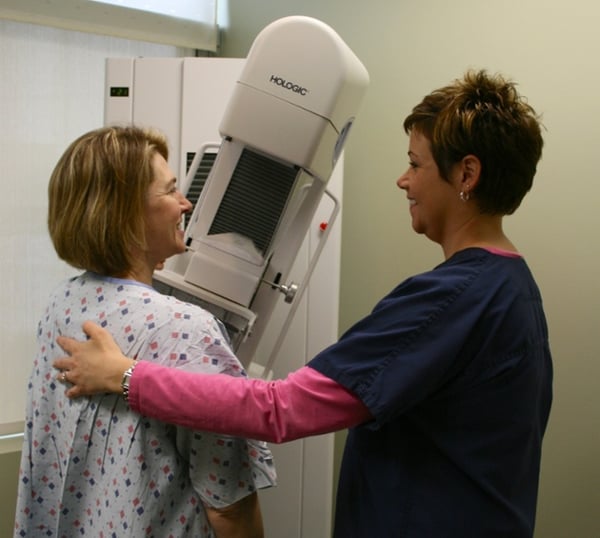 You’ve agreed with your doctor that you should get a mammogram. Now what? Some simple tips can help make your mammogram easier and less intimidating.
You’ve agreed with your doctor that you should get a mammogram. Now what? Some simple tips can help make your mammogram easier and less intimidating.How to Prepare for Your Mammogram
Advance Planning: Set Yourself Up for Success!
- Mammograms involve pressure and manipulation of your breast tissue, so try to schedule your mammogram for the point in your menstrual cycle when your breasts are least tender (usually the week after your period).[1]
- If caffeine enhances your breast tenderness, it is best to cut back in the days before your mammogram; otherwise, there is no need to fast or otherwise change your diet to prepare for your appointment.
- You shouldn’t use deodorants, antiperspirants, powders, lotions, creams or perfumes under your arms or on your breasts prior to your mammogram,[2] so try to schedule your appointment for first thing in the morning or after you’ll have showered (perhaps after a lunch workout).
- Let us know where your last mammogram was performed. If possible, we will contact that clinic so we can obtain previous images before you come for your mammogram. This ensures the most prompt results to your doctor.
- Also, it’s important to let us know your breast history, including previous mammograms, if any, and if you have or ever had breast implants.[3]
Day-of Preparation: Ready, Set, Go!
- It’s fine to take an over-the-counter pain medication such as Advil (ibuprofen), Tylenol (acetaminophen), or aspirin, either preventatively before your mammogram or afterward if you experience some tenderness.[4]
- Dressing in a two-piece outfit (pants or a skirt with a top) will allow you to keep your lower half covered in your hospital gown, which might help you feel less exposed and more comfortable.
- We provide aerosol deodorant to be used after the mammogram for your convenience. Otherwise, feel free to bring along deodorant, lotions, etc. if you’d like to apply them after your visit before returning to your daily routine.
- We offer free breast self exam cards as a reminder to perform your monthly self exams. They are laminated and can hang in your shower.
The Procedure: What to Expect
- The technologist will help position your breast in the machine, and a plastic plate will compress your breast tissue. This is to ensure that the best possible image can be taken of your breast tissue. You’ll be asked to hold your breath for a very short time, which helps decrease blurring from the movement of your breathing.
- Images will be taken of each breast compressed horizontally (top-to-bottom) and vertically (side-to-side). Each image should take only a few seconds.
- Your technician will take a look at the captured images to make sure they’re the best quality possible. More images may have to be taken to provide enough information for the radiologist, but the whole visit shouldn’t last very long at all.
- The machine uses X-rays to generate an image of your breast tissue. The radiation exposure and potential risk is very low.[5]
Follow-Up: Questions and Answers
- If you experience tenderness or discomfort following your mammogram, it’s fine to take over-the-counter pain medication (ibuprofen, acetaminophen, or aspirin).
- Your referring provider will receive a written report within a day or two, and you will receive a letter from us in about a week with your results. If there is anything the doctor would like to examine more closely, we may schedule additional imaging. A technologist would contact you to schedule this at your convenience.
For more information about preparing for your mammogram and understanding what to expect, download our free ebook.
The information contained in the Iowa Radiology website is presented as public service information only. It is not intended to be nor is it a substitute for professional medical advice.You should always seek the advice of your physician or other qualified healthcare provider if you think you may have a medical problem before starting any new treatment, or if you have any questions regarding your medical condition.
Iowa Radiology occasionally supplies links to other web sites as a service to its readers and is not in any way responsible for information provided by other organizations.
Sources
[1] http://www.mayoclinic.org/tests-procedures/mammogram/basics/how-you-prepare/prc-20012723
[3] http://www.cancer.gov/cancertopics/factsheet/detection/mammograms
[4] http://www.mayoclinic.org/tests-procedures/mammogram/basics/how-you-prepare/prc-20012723
[5] http://www.cancer.gov/cancertopics/factsheet/detection/mammograms


